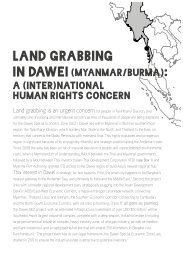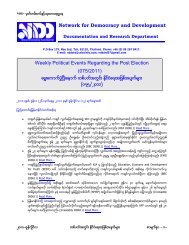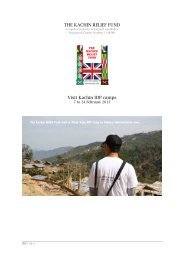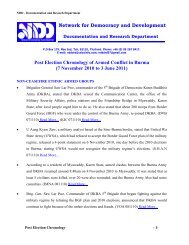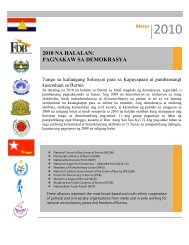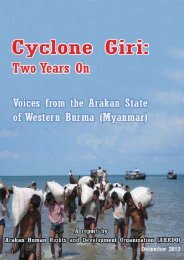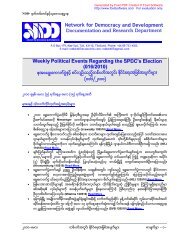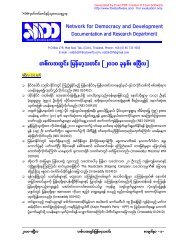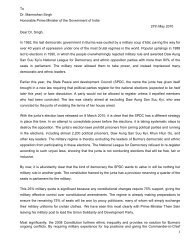The case for revenue transparency in the oil and gas ... - La'o Hamutuk
The case for revenue transparency in the oil and gas ... - La'o Hamutuk
The case for revenue transparency in the oil and gas ... - La'o Hamutuk
Create successful ePaper yourself
Turn your PDF publications into a flip-book with our unique Google optimized e-Paper software.
International st<strong>and</strong>ards of <strong>revenue</strong> <strong>transparency</strong><br />
International Monetary Fund (IMF) Guide on Resource Revenue<br />
Transparency<br />
<strong>The</strong> International Monetary Fund (IMF) has addressed <strong>the</strong> public<br />
f<strong>in</strong>ancial implications of extractive <strong>in</strong>dustries <strong>in</strong> resource-rich countries<br />
by urg<strong>in</strong>g greater <strong>transparency</strong> <strong>and</strong> accountability <strong>for</strong> f<strong>in</strong>ancial flows<br />
from extractive <strong>in</strong>dustries projects to government budgets. <strong>The</strong> IMF’s<br />
Guide on Resource Revenue Transparency, published <strong>in</strong> 2005 <strong>and</strong><br />
updated <strong>in</strong> 2007, outl<strong>in</strong>es best practices <strong>in</strong> four key areas: clarity of<br />
roles <strong>and</strong> responsibilities; public availability of <strong>in</strong><strong>for</strong>mation; open<br />
budget preparation, execution, <strong>and</strong> report<strong>in</strong>g; <strong>and</strong> assurances of<br />
<strong>in</strong>tegrity. Notably, <strong>the</strong> Guide argues <strong>for</strong> contract <strong>transparency</strong> <strong>in</strong><br />
addition to <strong>revenue</strong> <strong>transparency</strong>. <strong>The</strong> International Monetary Fund<br />
specifies four elements of <strong>revenue</strong> <strong>transparency</strong>: 55<br />
Burma is currently not follow<strong>in</strong>g<br />
any <strong>in</strong>ternational st<strong>and</strong>ards on<br />
<strong>revenue</strong> <strong>transparency</strong><br />
1 Clarity of Roles <strong>and</strong> Responsibilities. This <strong>in</strong>cludes hav<strong>in</strong>g a legal<br />
<strong>revenue</strong> management system, where <strong>the</strong>re are specific laws that<br />
govern where <strong>revenue</strong>s are deposited, who has access to <strong>the</strong>m,<br />
<strong>and</strong> how <strong>the</strong>y are spent.<br />
2 Open Budget Process. In<strong>for</strong>mation about how resource <strong>revenue</strong>s<br />
are spent <strong>and</strong> how <strong>the</strong>y are used <strong>in</strong> <strong>the</strong> national budget should be<br />
open <strong>and</strong> clear.<br />
3 Public Availability of In<strong>for</strong>mation. In<strong>for</strong>mation related to natural<br />
resource <strong>revenue</strong>s should be available to <strong>the</strong> public. This <strong>in</strong>cludes<br />
<strong>the</strong> estimated value of reserves, <strong>the</strong> amount of money paid by<br />
companies to <strong>the</strong> government, how much of that money is kept<br />
<strong>and</strong>/or used by <strong>the</strong> government, contracts between <strong>the</strong> government<br />
<strong>and</strong> companies, <strong>and</strong> o<strong>the</strong>r relevant <strong>in</strong><strong>for</strong>mation.<br />
4 Assurances of Integrity. Internationally-recognized systems of<br />
account<strong>in</strong>g systems should be used, <strong>and</strong> regular audits should be<br />
conducted <strong>and</strong> released to <strong>the</strong> public.<br />
‣ Burma is a member of <strong>the</strong> IMF but follow<strong>in</strong>g <strong>the</strong> IMF’s Guide is<br />
not required of member governments<br />
<strong>The</strong> EITI<br />
<strong>The</strong> most widely used global st<strong>and</strong>ards <strong>for</strong> <strong>revenue</strong> <strong>transparency</strong> are<br />
conta<strong>in</strong>ed <strong>in</strong> <strong>the</strong> voluntary protocol Extractive Industries Transparency<br />
Initiative (EITI), which currently has 30 C<strong>and</strong>idate <strong>and</strong> Compliant<br />
Countries from different parts of <strong>the</strong> world. <strong>The</strong> EITI promotes <strong>revenue</strong><br />
<strong>transparency</strong> through monitor<strong>in</strong>g <strong>and</strong> reconcil<strong>in</strong>g company payments<br />
<strong>and</strong> government <strong>revenue</strong>s at <strong>the</strong> country level. <strong>The</strong> process is overseen<br />
by participants from <strong>the</strong> government, companies <strong>and</strong> civil society. 56 As<br />
applied to states, <strong>the</strong> EITI Pr<strong>in</strong>ciples encourage several factors related<br />
to <strong>revenue</strong> <strong>transparency</strong>, <strong>in</strong>clud<strong>in</strong>g 1) <strong>the</strong> use of <strong>revenue</strong> wealth <strong>for</strong><br />
susta<strong>in</strong>able growth; 2) public underst<strong>and</strong><strong>in</strong>g <strong>and</strong> participation;<br />
22




